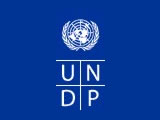|
|
TODAY.AZ / World news
UNDP center opened in Istanbul
12 March 2011 [14:13] - TODAY.AZ
 Istanbul branch of the United Nations Development Program (UNDP) International Center for Private Sector in Development was opened on Friday.
Istanbul branch of the United Nations Development Program (UNDP) International Center for Private Sector in Development was opened on Friday.Speaking at the inauguration ceremony, Turkish State Minister Cevdet Yilmaz said Istanbul in a sense became a center where the United Nations offered regional services.
The center in Eminonu district of Istanbul targets economic development as final target and aims at encouraging private sector to fulfill Millennium Development Goals.
Yilmaz said an office of the UN moved to Istanbul last year, and the center inaugurated today was the second office of the UN in Istanbul, "Turkey gave a successful examination particularly in global crisis environment. Private sector achieved this. Public institutions carried out correct policies. Private sector recorded a dynamic development. Turkey achieved a significant growth rate. Nearly 80 percent of the investments of Turkey are made by private sector. It provides 88 percent of employment. Turkey's private sector is very dynamic and strong. To this end, Turkey's selection is not a coincidence," he noted.
"As of 2010, Turkey has made nearly one billion USD foreign assistance. We are in a position to make important contributions to international organizations," Yılmaz said.
Yilmaz said UNDP did not only consider Turkey as a program country but a partner which it could make global cooperation.
UNDP Administrator Helen Clark said the Center would be a significant symbol which would carry cooperation between the Turkish government and UNDP to a new level.
Clark said the incidents that occurred in various Arabic countries this year pointed to the importance of sustainable growth and development and noted that countries need dynamic and competitive markets and job opportunities to meet the expectations of their people.
Clark said private sector has a crucial role in ensuring comprehensive development.
UNDP is the UN's global development network, advocating for change and connecting countries to knowledge, experience and resources to help people build better lives. The organisation is on the ground in 166 countries, working with them to find their own solutions to global and national development challenges.
/World Bulletin/
URL: http://www.today.az/news/regions/82492.html
 Print version
Print version
Views: 2800
Connect with us. Get latest news and updates.
See Also
- 03 January 2025 [23:30]
Digitalization and AI set to drive global tourism growth in 2025 - 03 January 2025 [22:21]
US approves $3.64 billion sale of missiles to Japan - 03 January 2025 [20:23]
Kazakhstan plans to build additional nuclear power plants - 03 January 2025 [19:19]
Sweden sees surge in cocaine seizures amid growing global drug trade - 03 January 2025 [18:40]
Over 40 cars collide in chain accident on Kazakhstan highway - 03 January 2025 [18:27]
Large-scale operation in Turkiye leads to ISIS-related arrests - 03 January 2025 [10:36]
Two police officers injured in Berlin explosion near police station - 03 January 2025 [10:00]
Kazakhstan ensures objective investigation into Azerbaijan Airlines plane crash - 03 January 2025 [09:00]
Pakistani imports grow after two years - 03 January 2025 [08:00]
China's operating high-speed railway to hit 60,000 km by 2030
Most Popular
 Azerbaijan's State Water Resources Agency to rebuild key canal in Nakhchivan
Azerbaijan's State Water Resources Agency to rebuild key canal in Nakhchivan
 President Ilham Aliyev expresses condolences to President of Montenegro
President Ilham Aliyev expresses condolences to President of Montenegro
 Tehran’s Anti-Azerbaijani Rhetoric Undermines Diplomatic Intentions
Tehran’s Anti-Azerbaijani Rhetoric Undermines Diplomatic Intentions
 Azerbaijan’s MFA extends condolences to Montenegro
Azerbaijan’s MFA extends condolences to Montenegro
 China's operating high-speed railway to hit 60,000 km by 2030
China's operating high-speed railway to hit 60,000 km by 2030
 McDonald's Azerbaijan plans to expand network to 50 restaurants
McDonald's Azerbaijan plans to expand network to 50 restaurants
 Today is birthday of Azerbaijani National Hero Polad Hashimov
Today is birthday of Azerbaijani National Hero Polad Hashimov
